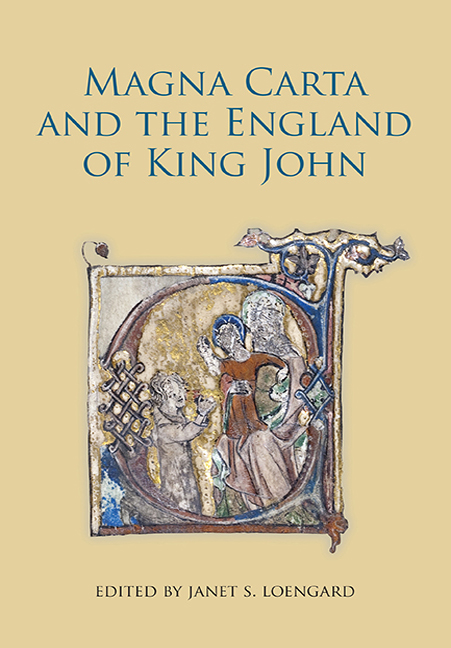Book contents
- Frontmatter
- Contents
- List of Contributors
- List of Abbreviations
- Introduction
- England in 1215: An Authoritarian Angevin Dynasty Facing Multiple Threats
- The Anonymous of Béthune, King John and Magna Carta
- Baronial Paranoia in King John's Reign
- The Forest Eyre in the Reign of King John
- The Managerial Revolution in the English Church
- Magna Carta, the ius commune, and English Common Law
- Justice without Judgment: Criminal Prosecution before Magna Carta
- What Did Magna Carta Mean to Widows?
- The English Economy in the Age of Magna Carta
- The Complaint of King John against William de Briouze (c. September 1210)
- Index
Introduction
Published online by Cambridge University Press: 28 April 2017
- Frontmatter
- Contents
- List of Contributors
- List of Abbreviations
- Introduction
- England in 1215: An Authoritarian Angevin Dynasty Facing Multiple Threats
- The Anonymous of Béthune, King John and Magna Carta
- Baronial Paranoia in King John's Reign
- The Forest Eyre in the Reign of King John
- The Managerial Revolution in the English Church
- Magna Carta, the ius commune, and English Common Law
- Justice without Judgment: Criminal Prosecution before Magna Carta
- What Did Magna Carta Mean to Widows?
- The English Economy in the Age of Magna Carta
- The Complaint of King John against William de Briouze (c. September 1210)
- Index
Summary
It is certainly a testament to the vitality of Magna Carta that a conference invoking its name was held in Pennsylvania almost 800 years after Runnymede. This volume has its genesis in that conference, ‘Magna Carta and the World of King John’, at Pennsylvania State University in March 2008. As it happened, all the papers presented there dealt primarily with England, hence the change in the title of this book. Together, they explore the economic, social, political, and personal factors which ultimately affected the relationship of king and subjects. To borrow the title of a recent volume, their theme might be said to be ‘Why Magna Carta?’
In both the United States and the United Kingdom, books and articles with interpretations and analyses of the Charter have appeared regularly. Their focus has shifted over time. Nineteenth century work tended to concentrate on constitutional and political history, speculating on thirteenth-century political thought and often tracing the effect of various Charter provisions on one or more later periods in British history. There was also a tendency to inject an author's view of the morality of barons and/or king into the discussion; John Hudson touches on both points in his essay here when he speaks of historians’ former tendency to write in terms of ‘the nature of political thinking amongst the lay elite’ and of ‘the moral terms in which the question of … lay ideals for reform in 1215 used to be posed – for example, how far were the barons of 1215 self-interested, how far altruistic.’ Particularly in the second half of the twentieth century, that focus shifted. Historians concerned themselves with exploring the social and economic networks of early thirteenth century England, as well as tracing the background of specific grievances, which led the barons to embark on what David Crouch in his essay refers to as the Barons’ Rebellion. In part this may reflect changing trends in the discipline of history, but in part it must be related to the vast increase in the number of primary sources readily available to historians, thanks to the publications of county record societies, The National Archives, the Selden Society, the Ames Foundation, and other groups both British and American. The plea rolls, charters, pipe rolls, and various administrative records have led to a more nuanced view of John's governance and its reception by his subjects, baronial or other.
- Type
- Chapter
- Information
- Magna Carta and the England of King John , pp. 1 - 9Publisher: Boydell & BrewerPrint publication year: 2010



